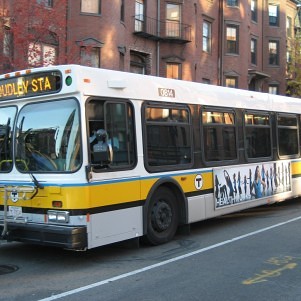Up To 17 Cents A Gallon — New Carbon Emissions Tax Would Add $$ To Gasoline Prices
By State House News Service | December 18, 2019, 12:47 EST
 Photo curtesy of Flickr.com.
Photo curtesy of Flickr.com. The pact being developed by Massachusetts and other East Coast states to cap carbon emissions from vehicles could add up to 17 cents to the price of a gallon of gas, according to the newest estimates, but could also generate more than $500 million in revenue for state government in Massachusetts.
Leaders from a coalition of eastern states, including Massachusetts, have been working for over a year to develop a regional “cap-and-invest” program to reduce carbon pollution from cars and trucks and generate the resources needed to expand clean transit options and improve public health.
The effort, known as the Transportation Climate Initiative, has also become a central part of Governor Charlie Baker’s transportation and climate agenda, with the administration proposing to earmark half of all proceeds generated toward improving public transit.
But the coalition already began to splinter Tuesday in light of the newly forecast economic impacts, with New Hampshire Governor Chris Sununu announcing that his state would not participate.
“We are already taking substantial steps to curb our carbon emissions, & this initiative, if enacted, would institute a new gas tax by up to 17 cents per gallon while only achieving minimal results. This program is a financial boondoggle and the people of NH will never support it,” Sununu wrote on Twitter.
The coalition, chaired by Massachusetts Energy and Environmental Affairs Secretary Kathleen Theoharides, released a draft memorandum of understanding on Tuesday, December 17 that states would be asked to sign onto next spring once it is finalized.
The officials involved in the effort are eyeing a reduction in emissions of up to 25 percent by 2032, but it will come at a cost.
States in the coalition are exploring three scenarios for capping emissions from motor gasoline and on-road diesel, with a final cap proposed after a public comment period ends on Friday, February 28, 2020.
The plan to reduce carbon emissions from vehicles by 25 percent would add an estimated 17 cents to the price of a gallon of gas at the pump starting in 2022. If states elected for a smaller reduction goal of 22 percent, the cost per gallon, based on the group’s modeling, would drop to 9 cents.
The third option presented is for a 20 percent emission reduction by 2032 at a cost to drivers of 5 cents per gallon.
Theoharides said the Transportation Climate Initiative represents a “chance to really make a global impact on emission reductions.”
Chris Hoagland, and economist in the climate change division of Maryland’s Department of the Environment, said the Transportation Climate Initiative model showed that emissions from vehicles – which cover 43 percent of all emissions in the region – would decline by 6 percent to 19 percent without any additional action.
That drop, according to Hoagland, would result from the ongoing shift to more fuel-efficient cars and trucks, but could fluctuate depending on whether federal fuel efficiency standards are rolled back.
“The thing that is important is that while the reference case does show 19 percent due to clean vehicle standards and the adoption of electric vehicles, those reductions are not guaranteed and they could be as low as 6 percent. What this policy does is lock in those reductions,” Theoharides said.
She also suggested that member states would also meet every few years to review the program, and could accelerate the emission reduction targets in the future.
The new economic forecasts also figure to play heavily into the upcoming debate that House Speaker Robert DeLeo has planned for January to generate new revenue for transportation.
Several of his top deputies have suggested a gas tax hike would be high on the list of options.
While a straight gas tax hike may be less popular with business leaders, the Transportation and Climate Initiative has significant backing from many of the major environmental and employer groups in Massachusetts, including Associated Industries of Massachusetts and the Greater Boston Chamber of Commerce.
Transit activists also see an opportunity in the program to generate significant new resources to invest in improved public transit and build new sidewalks and bicycle paths.
“We applaud Governor Baker’s leadership in advancing this important public policy initiative that will improve the lives of people in every corner of the Commonwealth who use our transportation system, breathe the air, or care about climate change. TCI will stand as a model for the rest of the nation,” said Chris Dempsey, director of Transportation for Massachusetts.
The concept, however, has been coming under increasing fire from a small group of Republican legislators and small business groups.
State Representative Timothy Whelan, a Brewster Republican, and state Representative Marc Lombardo, a Billerica Republican, both submitted public comments to the coalition arguing that the Legislature should get to vote before Massachusetts joins any partnership.
The National Federation of Independent Business in Massachusetts, the Massachusetts Fiscal Alliance, and Citizens for Limited Taxation were also among a cohort of business and anti-tax groups from Maine to Virginia to sign on to a letter released Tuesday, December 17 opposing the Transportation Climate Initiative because of the additional cost it will add for employers.
“Make no mistake, this is a tax,” the groups wrote in their letter. “More precisely, it is a carbon dioxide tax being implemented through a gas tax.”
The opponents argued that not only would the program add to municipal costs for busing, plowing and other services, but low-income families and small business owners would feel the pinch.
“Since motor fuels are economically ‘inelastic,’ the higher costs imposed by the TCI’s fuel tax will have to come out of other areas of household budgets,” the letter stated.
State Senator Marc Pacheco (D-Taunton) and the Baker administration have said the Massachusetts Legislature would not need to vote on participation because the legislators authorized the administration to pursue regional market-based approaches to fight climate change in the 2008 Global Warming Solutions Act.
A MassINC poll released Wednesday says that a majority of registered voters in Massachusetts, Connecticut, Maryland, New York, New Jersey, Pennsylvania, and Virginia — the largest states in the coalition — strongly or somewhat support their home state’s participation in the Transportation and Climate Initiative.
In Massachusetts, 68 percent of the 629 respondents said they support the program, compared to 21 percent who oppose it and 11 percent who are unsure, according to the poll, which was sponsored by the Barr Foundation and conducted before the latest estimated impacts on gas prices were known.
Theoharides said that unlike a gas tax the price per gallon is not fixed under the compact and would depend on how the market responds to the caps that get adopted on pollution and how much of the expense suppliers pass on to consumers.
The program would set a limit on emissions from fuel, and hold auctions at which fuel suppliers that transport gasoline into Massachusetts and other states could purchase allowances for every ton of carbon dioxide that the fuel they are carrying would emit when burned.
The states estimate that the program could generate $7 billion a year across the region by 2032 in proceeds from these auctions, sending $500 million or more back to Massachusetts to be reinvested in clean transit options.
Baker proposed in a transportation bond bill still pending before the Legislature to set aside half of any new revenue to the state for public transit.
Theoharides also said the state would look to invest in electrification of public transit, charging corridors for electric vehicles, more electric buses, ways to make it easier to walk and bike, and telecommuting infrastructure for more rural areas.
“We are going to double down on the investments that reduce emissions so that we can get the most bang for our buck,” Theoharides said.
Twelve states and the District of Columbia have been working with the Georgetown Climate Center to put together the Transportation Climate Initiative since late 2018.
The cap-and-invest program is modeled off the Regional Greenhouse Gas Initiative, which focused on driving down emissions from power plants, but Theoharides said it has the potential to reduce carbon emissions by three times the levels achieved through the Regional Greenhouse Gas Initiative.
“One of the big pieces for us is getting as many states on board as we can,” Theoharides said.
In addition to Sununu, Vermont’s Republican Governor Phil Scott has also expressed reservations about joining the pact. Theoharides said that while there does need to be a “critical mass” of participation for the program to work, she did not think all 13 jurisdictions would need to sign on for the program to be successful.
The coalition has estimated $10 billion in public health benefits through the program from reduced cases of conditions like asthma, between 1,900 and 8,900 new jobs and $892 in avoided costs due to climate change.
The Harvard School of Public Health plans to do a more detailed health analysis for early 2020.
The TCI coalition states represent 72 million people and 52 million registered vehicles, with a gross domestic product larger than the economy of California at $5.3 trillion.











